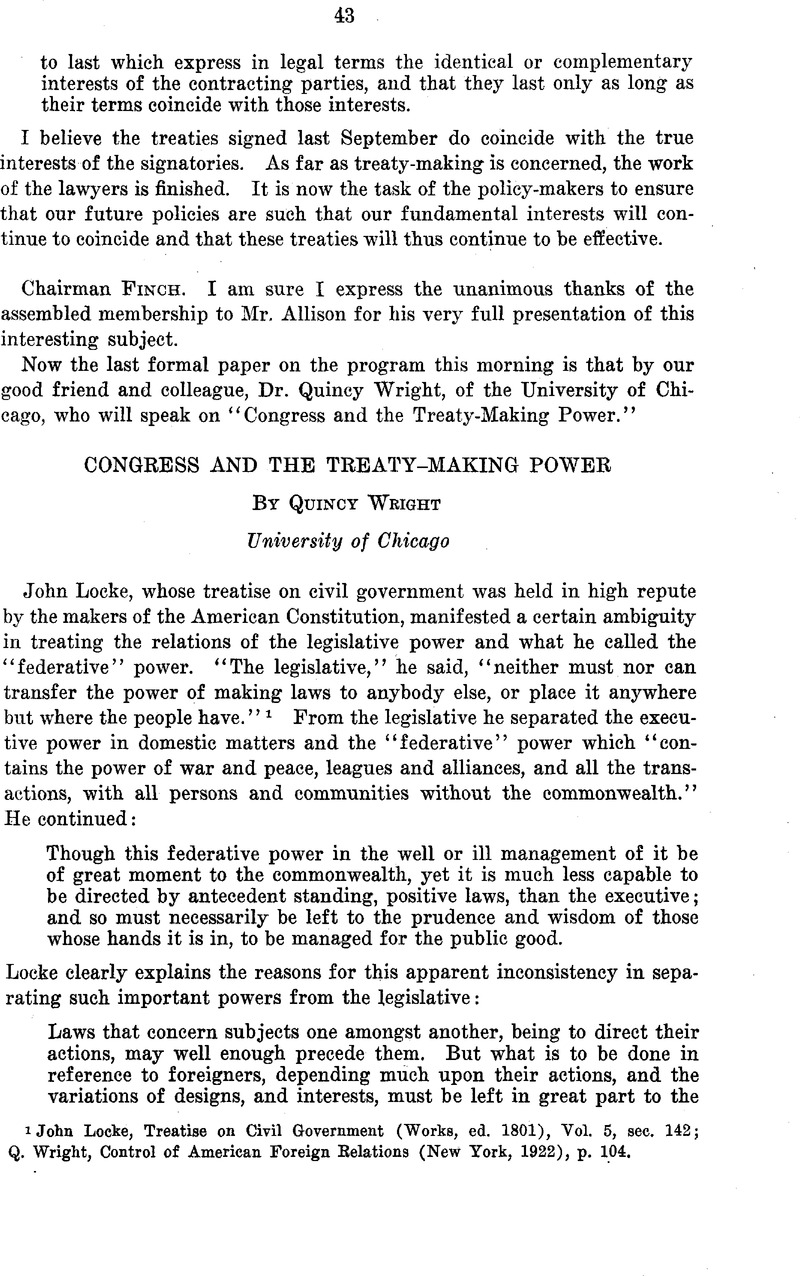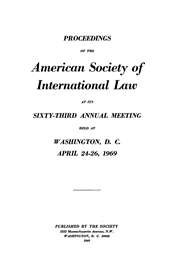No CrossRef data available.
Article contents
Congress and the Treaty-Making Power
Published online by Cambridge University Press: 27 February 2017
Abstract

- Type
- Second Session
- Information
- Copyright
- Copyright © American Society of International Law 1952
References
1 Locke John, Treatise on Civil Government (Works, ed. 1801), Vol. 5, sec. 142; Q. Wright, Control of American Foreign Relations (New York, 1922), p. 104.
2 Locke, op. cit., secs. 425-426; Wright, op. cit., pp. 141–142.
3 L’Esprit des Lois, xi, c. 6 (ed., Philadelphia, 1802), Vol. 1, p. 181; Wright, op. cit., p. 142.
4 Wood George C., Congressional Control of Foreign Relations during the American Revolution, 1774–1789 (New York University, 1919), p. 26; Q. Wright, “Domestic Control of Foreign Affairs,” in Rowland C. P. (ed.), Survey of American Foreign Relations (Council on Foreign Relations, New York, 1928), p. 92 ff.
5 U. S. V. Curtiss-Wright Corporation (1936), 299 U. S. 304.
6 Holland Missouri v. (1920), 252 U. S. 416.
7 U. S. v. Belmont (1937), 301 U. S. 324; U. S. v. Pink (1942), 315 U. S. 203.
8 McDougal Myres and Lana Asher, “Treaties and Congressional-Executive Agreements or Presidential Agreements,” Yale Law Journal, Vol. 54 (March, 1945), p. 310 ff.
9 U. S. v. Pink, supra. Stone, C. J., with Roberts, J., dissented on the ground that no Federal action in the matter indicated an intention to remove the issue from the State law normally applicable, See Levitan David M., “Executive Agreements,” Illinois Law Review, Vol. 35 (December, 1940), pp. 394–395.
10 U. S. v. Curtiss-Wright Corporation, supra.
11 Wriston Henry M., Executive Agents in American Foreign Relations (Baltimore, 1929) ; Q. Wright, Control of American Foreign Relations, pp. 249, 328–333.
12 Wright, Q., “The United States and International Agreements,” American Journal of International Law, Vol. 38 (1944), pp. 341, 348 ffCrossRefGoogle Scholar.
13 oore J.B., Digest of International Law, Vol, 5, pp. 80, 167; Wright, Control of American Foreign Relations, pp. 55, 81. Standing Instructions were issued not to grant this immunity to consuls in future treaties.
14 Tobacco Cherokee v. U. S., 11 Wall. 619, 620; Riggs Geofroy v., 133 U. S. 525, 567; Seattle Asakura v., 265 U. S. 230, 341; Wright, Control of American Foreign Relations, p. 80 ff.
15 Chinese Exclusion Cases (1889), 130 U. S. 58; Wright, op. cit., pp. 6, 101 ff., 226 ff, 260 ff., 344 ff.
16 Ibid., pp. 7, 126, 339 ff.
17 Holt W.Stull, Treaties Defeated by the Senate, Conclusion; Kenneth Colegrove, The American Senate and World Peace (New York, 1944), p. 9 ff.
18 Wright Q., “The United States and International Agreements,” loc. cit., p. 355.
19 Wright, Control of American Foreign Relations, p. 368; Colegrove, op. cit., p. 166 See 82nd Cong., 1st Sess., H. J. Res. 77, Jan. 8, 1951 (Mills); 198, March 12, 1951 (Gossett) ; 295, July 18, 1951 (Stockman).
20 Dahl, Robert A., Congress and Foreign Policy (New York, 1950), p. 225 ffGoogle Scholar.
21 This was a slight modification of Senator Bricker’s resolution introduced on Sept. 14, 1951, 82nd Cong., 1st Sess., S. J. Res. 102. See also 82nd Cong., 2nd Sess., S. J. Res. 122, Jan. 21, 1952 (McCarran).
22 82nd Cong., 2nd Sess., H. J. Res. 376, Feb. 11, 1952 (Smith of Wis.) ; 379, Feb. 14, 1952 (Hebert) ; 390, Feb. 21, 1952 (Auchincloss). See also 82nd Cong., 1st Seas., H. J. Res. 329, Sept. 19, 1951 (Phillips) ; 334, Sept. 26, 1951 (Dondero) ; 82nd Cong., 2nd Sess., H. R. 6393, Feb. 4, 1952 (Ellsworth) ; 6522, Feb. 11, 1952 (Bramblett) ; 6590, Feb. 14, 1952 (O’Hara).
23 The Slaughter House Cases (1872), 16 Wall. 36.
24 Above, notes 13, 14.
25 Art. 18, par. 2; Dept. of State Bulletin, Vol. 25, No. 626 (June 25, 1951), p. 1010.
26 Art. 13, ibid.
27 Holland Missouri v. (1920), 252 U. S. 416; Wright, Control of American Foreign Relations, pp. 86–87.
28 Preuss, Lawrence, “Some Aspects of the Human Rights Provisions of the Charter,” American Journal of International Law, Vol. 46 (1952), p. 292 ff.CrossRefGoogle Scholar; Wright, Q., “National Courts and Human Rights—The Fujii Case,” ibid., Vol. 45 (1951), p. 62 ffGoogle Scholar.
29 Above, notes 13 and 14.
30 The First Amendment, it is true, says: “Congress shall make no laws,” but its guarantees have been held applicable to the States by virtue of the 14th Amendment and to all organs of the Federal Government.
31 Florence E., Allen, The Treaty as an Instrument of Legislation (New York, 1952), pp. 29 ff., 38 ffGoogle Scholar.
32 Borchard, E. M., Diplomatic Protection of Citizens Abroad (New York, 1919), p. 33 ffGoogle Scholar.
33 The suggestion of Holmes, J., in Holland Missouri v. (cit.) that “treaties made under the authority of the United States” may escape constitutional limitations more than Acts of Congress “made in pursuance” of the Constitution, has not been accepted. The difference in phraseology in the supremacy clause was due to the desire to make treaties made before the Constitution was in force, especially the Peace Treaty of 1783, supersede State laws. Wright, Control of American Foreign Relations, p. 57.
34 Wimbledon Case, P.C.I.J., 1923, Series A, 1, p. 25; 1 World Court Reports 175; Exchange of Greek and Turkish Populations, P.C.I.J., 1925, Series B, 16, p. 21; 1 World Court Reports 434; Jurisdiction of Danube Commission, P.C.I.J., 1927, Series B, 14, p. 36; 2 World Court Reports 163.
35 The Tunis Nationality Decrees, P.C.I.J., 1923, Series B, 4, p. 26; 1 World Court Reports 157; Bulgarian, Hungarian, Rumanian Peace Treaties, I. C. J., Reports, 1950, p. 70; American Journal of International Law, Vol. 44 (1950), p. 745.
36 Wright, Q., “The Legal Nature of Treaties,” American Journal of International Law, Vol. 10 (1916), p. 717 CrossRefGoogle Scholar.
37 Hylton Ware v. (1796), 3 Dail. 199; Riggs Geofroy v. (1890), 133 U. S. 258; Wright, Control of American Foreign Relations, p. 89 ff.
38 Only labor conventions dealing with seamen’s rights, clearly within Federal jurisdiction, have been ratified. Allen, op. cit., p. 51 ff.
39 Moore, Digest, Vol. 5, p. 166; Wright, Control of American Foreign Relations, p. 101 ff.
40 U. S. Foreign Relations, 1909, p. 303 ff., Wright, op. cit., p. 117 ff. In Gordon v. U. S., 117 U. S. 697, the Supreme Court held that any provision for administrative review of its decisions would impair its constitutional power.
41 In re Ross (1890), 140 U. S. 453; MacArthur Hirota v. (1948), 338 U. S. 197; Johnson Flick v., 174 F. (2d) 983.
42 Lawrence Preuss, “The Execution of Treaty Obligations through Internal Law,” PROCEEDINGS, AMERICAN SOCIETY OF INTERNATIONAL LAW, 1951, p. 82 ff. See also Wright, “The Legal Nature of Treaties,” loc. cit., p. 706 ff.
43 Art. 71.
44 Art. 102.
45 See comments by Preuss, PROCEEDINGS, AMERICAN SOCIETY Or INTERNATIONAL LAW, 1951, cit., and American Journal of International Law, Vol. 46 (1952), p. 294. My attention has been called to an editorial in a local paper of Peoria, Ill., fearing that the First Amendment would be abolished by the Covenant of Human Rights, and to a sermon by the Rev. Edward D. Gates of that community on Oct. 17, 1951, repeated in an address to the Rotary Club, Nov. 23, 1951, to the same effect. The American Legion Post endorsed these opinions. This is typical of the agitation going on in the country.
46 Wright, Q., “Human Rights and World Order,” International Conciliation, April, 1943, No. 389, p. 244 ff.Google Scholar; Lauterpaeht, H., International Law and Human Rights (London, 1950), p. 123 ffGoogle Scholar.
47 In re Drummond Wren (1945), 4 Ontario Reports 778, 781; Hodge Hurd v. (1948), 68 Sup. Ct. 836, 853, 334 U. S. 24, 35; Fujii v. State (1950), 217 Pac. (2d) 481, 218 Pac. (2d) 595; Wright, , “National Courts and Human Rights—The Fujii Case,” American Journal of International Law, Vol. 45 (1951), p. 62 ff.CrossRefGoogle Scholar; the Supreme Court of California has sustained the opinion of the Court of Appeals in the Fujii case, but on the basis of the 14th Amendment of the Constitution, not of the United Nations Charter ; Preuss, American Journal of International Law, Vol. 46 (1952), p. 289 ff.; Paul, Sayre, “ Kraemer Shelley v. and United Nations Law,” Iowa Law Review, Vol. 34 (1948), p. 1 ff.Google Scholar; Lauterpaeht op. cit,, p. 145 ff. Courts have utilized the Universal Declaration of Human Rights in interpreting the Charter, but its value for this purpose has been questioned. Lauterpaeht, op. cit., p. 408 ff.
48 Wright Q., “Constitutionalism and World Politics,” University of Illinois Bulletin, Vol. 49 (Dec., 1951), No. 32; Control of American Foreign Relations, Chs. I, XVIII; “International Law and its Relation to Constitutional Law,” American Journal of International Law, Vol. 17 (1923), p. 234 ff.; Corwin, E. S., The President’s Control of Foreign Relations (Princeton, 1917);Google Scholar The Constitution and World Organization (Princeton, 1944).
49 McCamy, James L., The Administration of American Foreign Affairs (New York, 1950)Google Scholar; Dahl, Robert A., Congress and Foreign Policy (New York, 1950)Google Scholar; Brookings Institution, Government Mechanism for the Conduct of Foreign Relations (Washington, 1949); Morgenthau H. J. in Parliamentary Affairs, Vol. 3, No. 1; Wright Q., Control of American Foreign Relations, Ch. XIX reprinting in part, “The Control of Foreign Relations,” American Political Science Review (Feb., 1921), Vol. 15, p. 1 ff. More effective co-operation in foreign policy-making among organs of the Government and party leaders was urged in a resolution initiated by Paul Carrington and recommended by the Committee on Policy of the United States Chamber of Commerce on March 12, 1952.
50 McCamy, op. cit., p. 158.
51 Ibid., p. 343.




